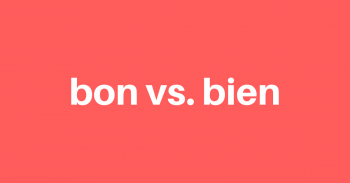Archive for 'Grammar'
Oh oh oh oh . . . C’est Cloclo! Posted by Tim Hildreth on Aug 16, 2016

Les JO continuent au Brésil. (The Olympics continue in Brazil.) So let’s had back to sunny Rio, cette semaine (this week) in the company of another famous French singer. Claude François, known affectionately as Cloclo, was a very popular artist in the French speaking world (and beyond) from the late 50’s through his tragic death…
Beginner’s Guide to French (Free eBook) Posted by Transparent Language on Jul 28, 2016

If you’re a fan of this blog, you’ll love our new Beginner’s Guide to French. Here on the French blog, we post a variety of content for learners of all levels. For the beginners among us who haven’t combed through our archives, you may be missing some of our older, but extremely useful introductory content…
French Grammar: Bon vs. Bien Posted by Elizabeth Schmermund on Jul 11, 2016

“Are you feeling good?” “Are you feeling well?” Which of these questions is grammatically correct in English? Most likely, if you recite these questions aloud, the first option (“Are you feeling good?”) sounds a bit off, even if you don’t know exactly why. And you would be right if you picked the second option (“Are you feeling…
French Grammar: The Past Conditional Posted by Elizabeth Schmermund on Jun 20, 2016
The French past conditional, also called the conditional perfect, is used to express what could or would have happened in the past if things had happened differently. As described in my post on si clauses, the past conditional often can follow the past tense in si clauses. For example, “si j’avais su que le magasin…
A vous de choisir! * Posted by Tim Hildreth on Jun 14, 2016
Vous: Qu’est-ce que c’est que ça ? Une chanson ? Encore ? Moi : Et oui, encore une chanson ! J’aime la musique, pas vous ? Et je voudrais partager celle-là avec vous.** The verb vouloir means « to want » or « to want to ». It’s very useful for expressing what your wishes and desires are when communicating with your French friends. When…
Que vas-tu faire? * Posted by Tim Hildreth on Jun 7, 2016
After last week’s example of the passé composé, I thought this week we’d take a look ahead . . . to the avenir (“the future”). There are two common ways of forming the future in French: the futur proche which like the passé composé is formed using an auxillary verb (recall that the passé composé…
Irregular French Verbs in the Imperative Mood Posted by Elizabeth Schmermund on Jun 6, 2016
We went over the imperative mood last week. Easy, right? Well, if you’ve studied French for any length of time, you know that there are many exceptions to main grammatical rules. And the imperative mood is no exception (like my calembour?) There are four common verbs that are irregular in the imperative mood. You should…


